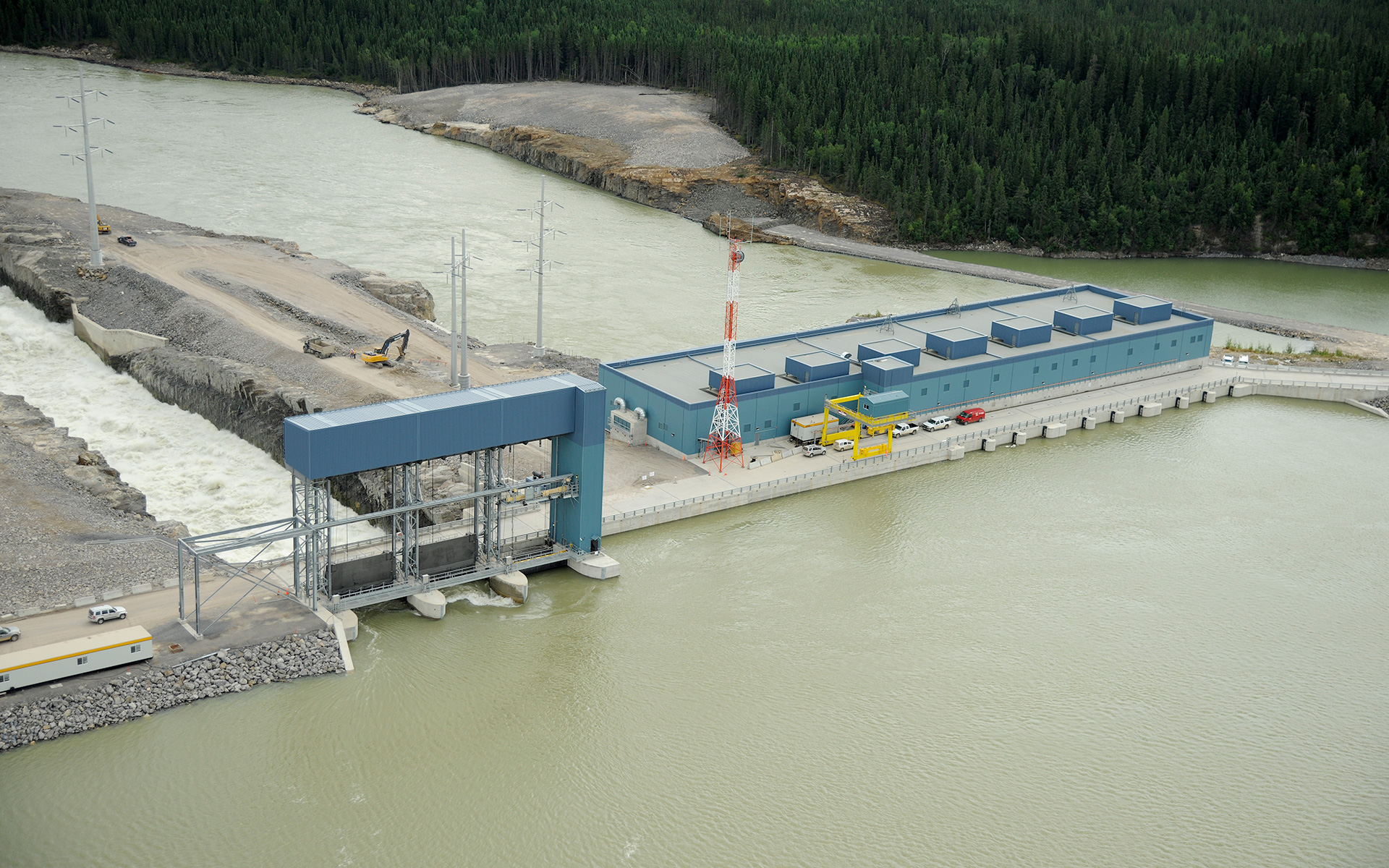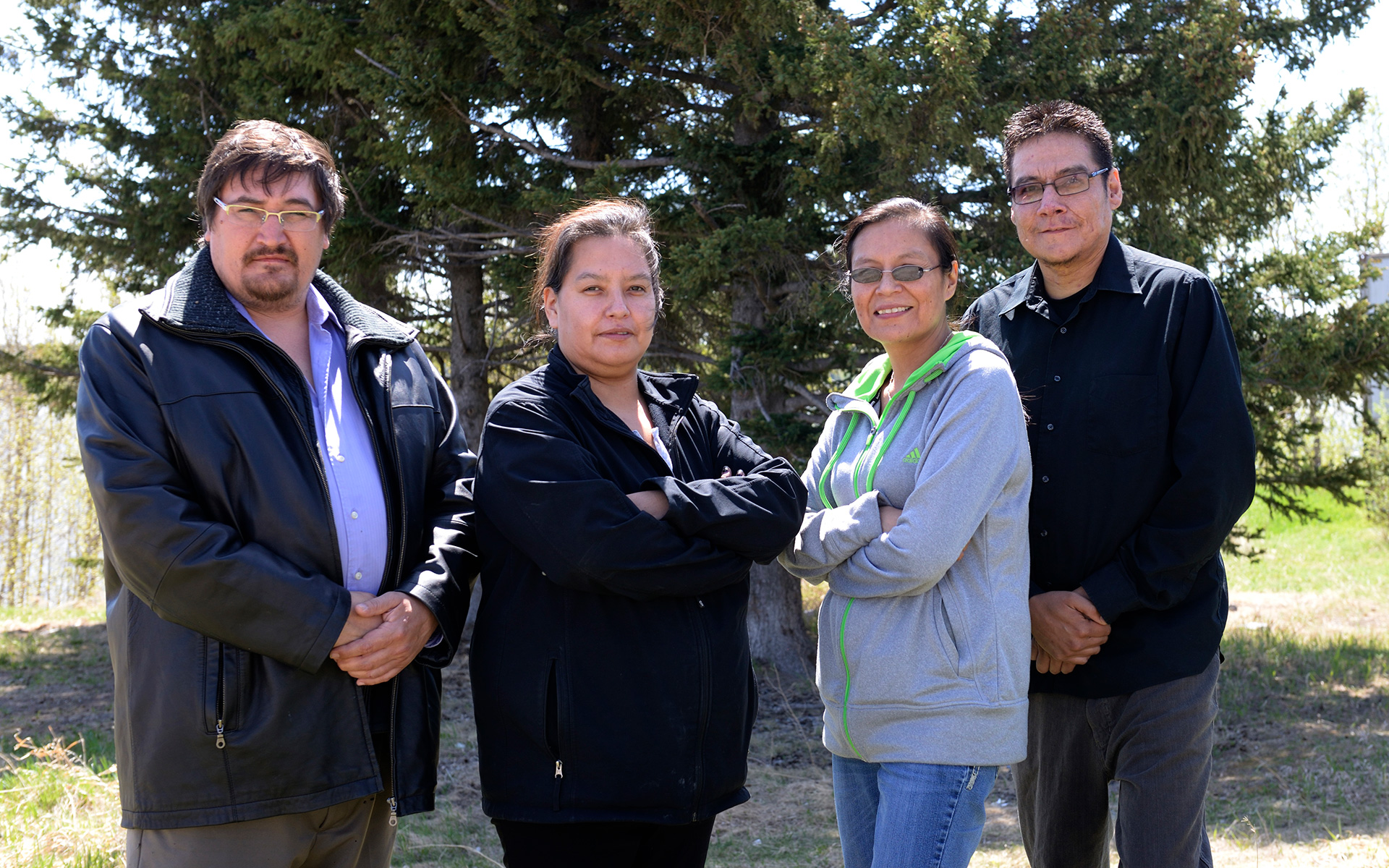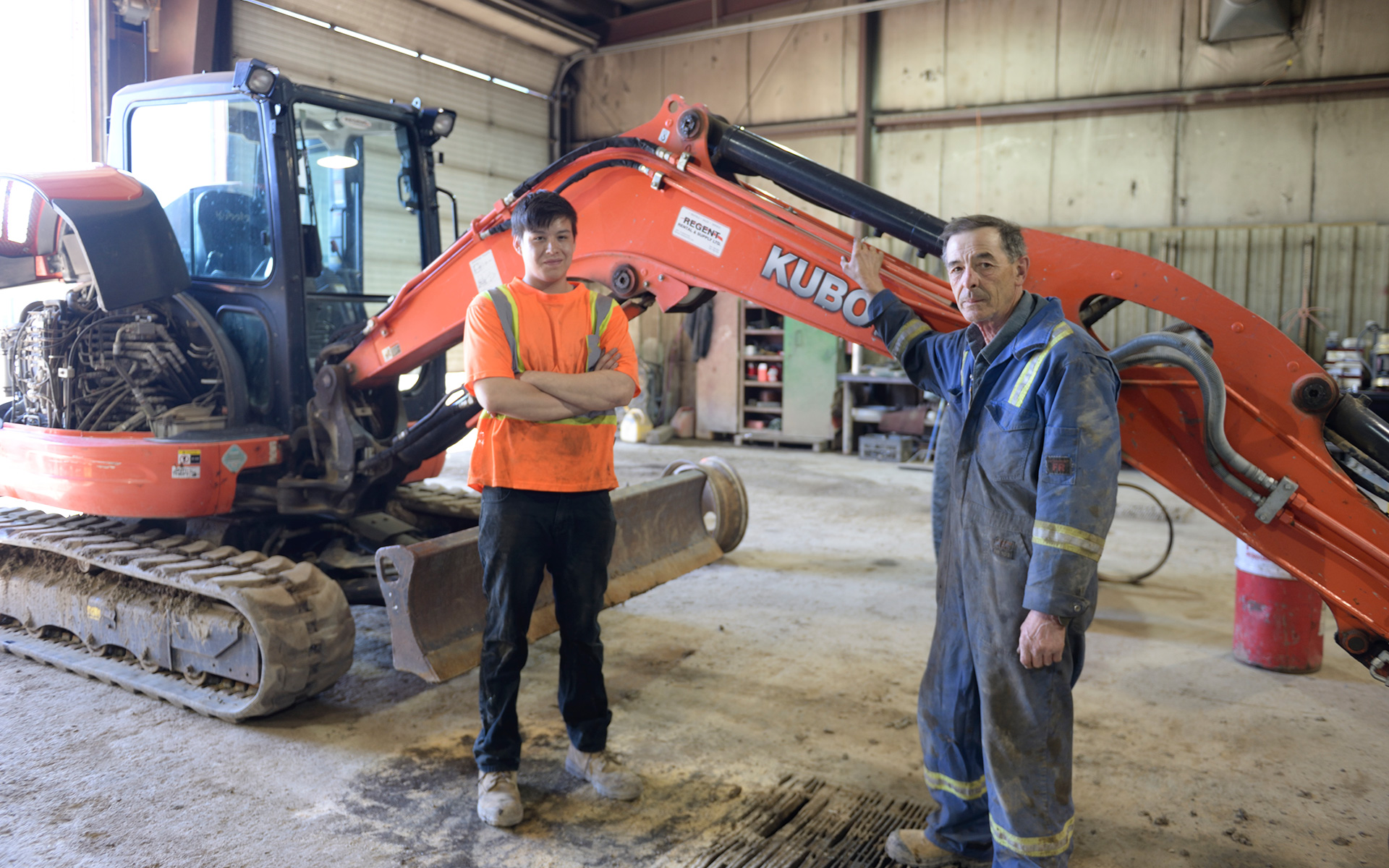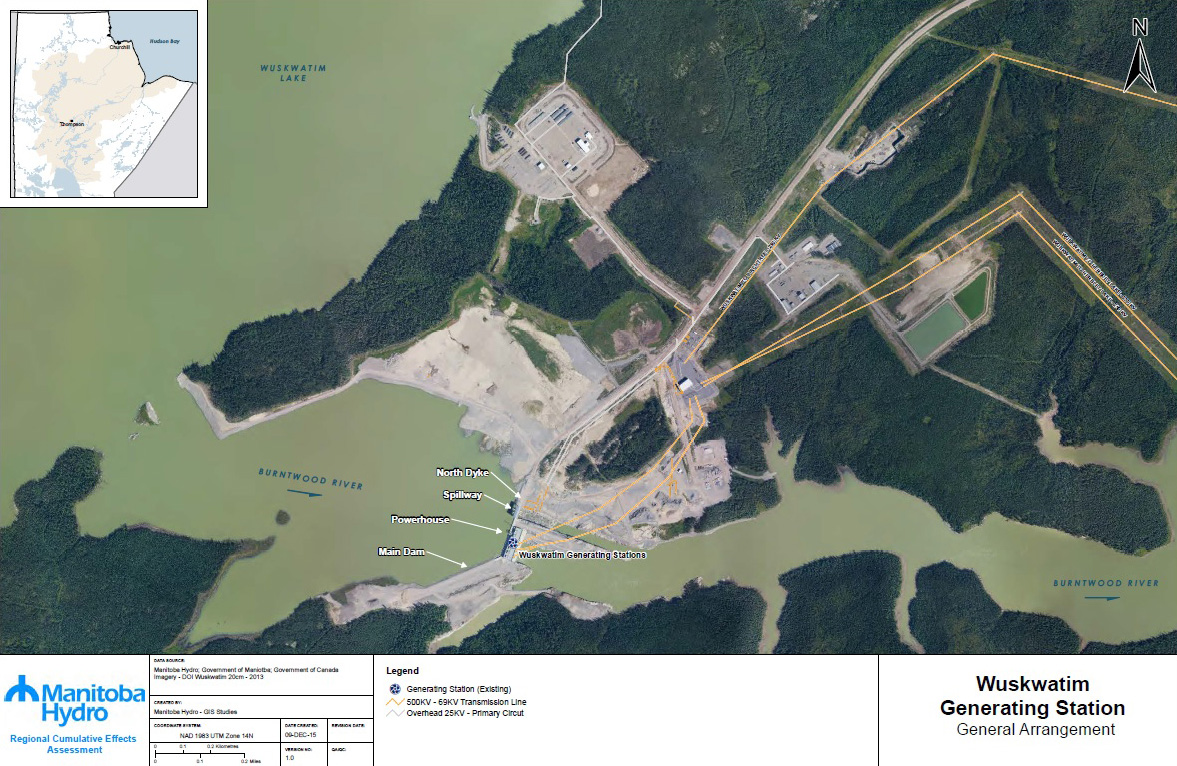Wuskwatim Project History

Wuskwatim is cree for beaver dam.
In 1997, NCN began negotiating with Manitoba Hydro to develop a 200-megawatt hydroelectric power dam at Taskinigahp Falls on the Burntwood River within the Nelson House Resource Management Area.
NCN’s participation was coordinated through its Future Development Team. The project offered considerable economic benefits to NCN through jobs, training and business opportunities during construction and long-term benefits through sustainable income to NCN from power sales.
An extensive environmental impact assessment was completed. The Manitoba Clean Environment Commission considered the economic and environmental issues as part of nearly four months of hearings on the project, which concluded June 9, 2004. It issued its report to the Manitoba Minister of Conservation, October 4, 2004, recommending the Wuskwatim project go forward.
Community Involvement in the Process
NCN had significant input into development of the Environmental Impact Statements, using Traditional Knowledge integrated with scientific knowledge.
NCN also consulted with federal regulators, resulting in Canada’s Comprehensive Study Report, issued in November 2005. The report concludes the Wuskwatim Generating Project “is not likely to cause significant adverse environmental effects.”
The Wuskwatim Project Development Agreement
Hydro and NCN signed a non-binding Agreement in Principle for the project in 2001 that would provide for an equity partnership in the project if NCN elects to exercise that option. The process of negotiations resulted in a Summary of Understandings, which formed the outline of a Project Development Agreement.
NCN Members voted to ratify the PDA in June 2006. The Wuskwatim Project Development Agreement was signed on June 26 by representatives of Manitoba Hydro and Nisichawayasihk Chief and Council in a colourful ceremony attended by several hundred people, including Manitoba Premier Gary Doer, seven members of the Manitoba government, as well as representatives of the federal government led by Rod Bruinooge, Member of Parliament and Parliamentary Undersecretary for Indian Affairs and Northern Development. Also attending were a large number of senior Hydro officials, several regional First Nation Chiefs and other government and business leaders from across northern Manitoba.
Unforeseen at the time of the PDA signing were major changes in the global economy that could affect the viability of NCN’s investment. These included:
- The near collapse of the global economy in 2008,
- The significant rise in the value of the Canadian dollar,
- Escalating costs for the project,
- The decreasing demand and pricing for export energy due to global recession and abundant cheap natural gas from fracking for electricity generation
- Terms on the Keeyask agreement not available in the Wuskwatim PDA.
This resulted in agreement to conduct a PDA review process starting in 2009 that culminated in a supplementary agreement provided additional loan option for NCN and an extension of the deadline for NCN to pay for its 33 percent ownership.
Construction was expected to take six years to complete with the first turbine generator going into service June 22, 2012 and the final turbine generator going into service in October 2012.
The Wuskwatim Generating Station

The Wuskwatim Generating Station is a 200-megawatt, hydroelectric generating station constructed between 2006 and 2012 on the Burntwood River in the Nelson House Resource Management Area.
We developed the project in partnership with Manitoba Hydro, the provincial Crown corporation responsible for providing energy resources, including electricity and natural gas within the province of Manitoba.
Discussions and negotiations leading to the agreement to build Wuskwatim were ongoing for nearly nine years, from 1997 to 2006, and involved consultation with Manitoba Hydro, NCN Citizens, the wider community and other interested parties, as well as government regulators. This development represented the first time in Canada a First Nation entered into and equity partnership with a major public utility.
Wuskwatim’s Location
Wuskwatim is located at Taskinigahp Falls, about 45 kilometres southwest of Thompson and 40 kilometres southeast of Nelson House.
While the partnership with Manitoba Hydro did not include the transmission lines, we consulted with Hydro in planning the best route through our territory and compensation for any impact on affected communities. Transmission line construction took place in phases over several years with most components complete by summer 2011.
Our recent history influenced how we have approached this project. Since the 1960s our people have, in one way or another, been involved with Manitoba Hydro regarding hydroelectric development in our traditional territory.
Learning From the Past
The Churchill River Diversion (CRD), constructed in the 1970s, had a great impact on our First Nation because the water level changes and flooding it caused affected our hunting, fishing, trapping and sacred sites. At that time, we could not prevent the massive CRD from going ahead and did not foresee the resulting changes to our environment and way of life. Governments and those developing natural resources had no duty to consult, and took very few steps to consult with us.
Fortunately, Cree People are strong, resilient and adaptable. We realized after 30 years of struggle for proper compensation and healing, that we needed to look ahead and not back. So in 1996, after hard, careful negotiations we signed the Northern Flood Implementation Agreement with Manitoba, Canada and Manitoba Hydro.
One important feature of the 1996 Agreement is the process for future development. If Manitoba Hydro wants to build new projects that may affect NCN, it has to finalize compensation arrangements with NCN before it can build.
What happened 40 years ago cannot happen today because we now have recognized, constitutionally protected rights and self-government. We also have a number of newer agreements in place that give us the power and the tools to negotiate and determine the use of our natural resources to benefit our First Nation.
A Cooperative Approach
From the beginning of the Wuskwatim project, there was a cooperative approach to development between Manitoba Hydro and NCN.
In 1997, NCN and Manitoba Hydro established a working group to facilitate ongoing consultation regarding the proposed development.
In late 1999, NCN and Manitoba Hydro selected a joint study team to conduct biophysical and socio-economic studies required as part of the regulatory approval process. The team designed and implemented a Joint Study Program to address the concerns and issues raised by NCN and Manitoba Hydro.
Joint Study Program
The joint study team provided:
- Environmental and socio-economic information that was used in the project-planning phase to avoid or minimize impacts and to address compensation issues where impacts could not be avoided or minimized.
- Information to conduct an environmental assessment of the proposed project and prepare an Environmental Impact Statement.
- Information on the existing environment in sufficient detail to allow for post-project monitoring.
Extensive Community Consultation
In addition to consultation between Hydro and NCN’s leadership and Future Development Team, we undertook extensive consultation between NCN leadership and its Members.
In this aspect, we blazed a new trail. From the beginning, this was a community-driven process and one of the most inclusive and comprehensive public consultation processes ever undertaken in Manitoba and with a First Nation.
The scope of activity was based on our desire to involve our Citizens in many ways, including participation in planning and through direct employment to support the process. In addition, we held two secret-ballot referendums to confirm Citizens’ support for the project.
A Public Involvement Plan set out the consultation process, which began in spring 2000 with an opinion survey of our Citizens and community open houses.
Community Consultants
In early 2000, the Future Development Office employed community consultants to assist in consultation with the wider Membership. These consultants were NCN Citizens including Elders and youth.
They distributed information and assisted with organizing and facilitating open houses, community meetings, small-group meetings and one-on-one presentations.
They answered questions and listened to concerns, which they communicated back to our Future Development Team, Hydro and NCN’s leadership.
The Future Development Office prepared the information they distributed, which included newsletters, information booklets and other documents. Our website and radio broadcasts of relevant information supported their work.
Key pieces of information and documents were translated into Cree and audiotapes were produced to assist the visually impaired or those having difficultly reading.
Consultation with the Wider Public
As part of the Public Information Plan, we also consulted with the wider public to keep them informed about the project and hear their perspectives about it. These groups included:
- Aboriginal peoples in other communities
- Other local residents
- Community groups
- Environmental groups
- The private sector
- Municipal governments
- Manitobans as a whole
- Regulators reviewing the project
Wuskwatim Regulatory Processes
Extensive consultation about the Wuskwatim project took place with provincial- and federal-government regulators. This was part of the duty to consult required by Section 35 of the Constitution.
The purpose was to consider how the project might affect Aboriginal rights and treaties before governments consider issuing required licenses and permits.
Representatives of Manitoba Water Stewardship, Manitoba Conservation, Manitoba Aboriginal and Northern Affairs and Fisheries and Oceans Canada gathered information and considered community concerns related to effects on Treaty and Aboriginal rights. Their work included consultation with NCN Citizens and other Aboriginal people in the region potentially affected by the Wuskwatim project.
Manitoba Hydro and NCN, along with a jointly selected Environmental Management Team prepared a comprehensive environmental assessment report on the project for federal and provincial regulators and the Clean Environment Commission, or CEC.
Clean Environment Commission (CEC)
The CEC is an arms-length provincial agency established under authority of the Environment Act of Manitoba. At the request of federal and provincial regulators, the CEC held public hearings in 2004 in Winnipeg, Thompson and The Pas on the Wuskwatim project. The hearings were well attended by NCN Citizens, other Aboriginal people, municipal governments, environmental groups, businesses and other organizations. In all, 32 days of hearings were held over four months, from March 1 to June 9, 2004.
The purpose of the CEC Hearing was:
- To examine the justification, “need for and alternatives to” the Wuskwatim Generating Station and Transmission Projects.
- To examine the potential environmental, socioeconomic and cultural effects of the construction and operation of the projects.
- To explore the extent and nature of the consultation that was involved in the project.
The CEC issued its report in October 2004, recommending the project go ahead. We were pleased with the outcome.
Environmental and Social Impact Assessments
Comprehensive environmental and social impact assessments were undertaken with results incorporated into design of the Wuskwatim project to ensure only minimal impact on our environment and way of life.
From the intensive consultation process, these assessments were made using both western science and Traditional Knowledge of our Elders and resource users – which is a first. These studies included effects on water, land, air, plants, animals and our people.
Everything we’ve done was motivated by what our people have told us and the needs of our children and our children’s children. We developed our proposal with the greatest respect for our people and our environment.
Comprehensive Study Report
Fisheries and Ocean Canada (F&O) undertook and submitted a comprehensive study of the Wuskwatim Generation Project to the Minister of the Environment and to the Canadian Environmental Assessment Agency. The study was done as part of a cooperative environmental assessment with the Government of Manitoba. It concluded that the project “is not likely to cause significant adverse environmental effects.”
Use of Traditional Knowledge
The Use of Traditional Knowledge in the Development of the Wuskwatim Project
The use of our Traditional Knowledge was instrumental in the selection of a 200-megawatt low-head design for the Wuskwatim generation project, rather than a high-head design, which would have generated 350 megawatts and far greater profits, but also far more environmental damage and flooding – 140 square kilometres .
The low-head design chosen for Wuskwatim created the least amount of flooding of any hydroelectric project ever developed in northern Manitoba – only 0.5 square kilometres – smaller than an average-size golf course. This flooding is just a small fraction of that caused by the CRD, which flooded 760 square kilometres.
The location of the construction camp and access road to the site were also selected using the Traditional Knowledge of our Elders and resource users. We have also used our Traditional Knowledge in the development of an access-management plan to protect our resources and sacred places around the Wuskwatim dam.
Promoting our Culture
Throughout construction, we offered on-site cross-cultural awareness workshops and counselling for workers on the project, organized by a full-time coordinator and support staff. Click to download a copy of the On-site Counseling Services brochure used. Feasts, sweat lodge ceremonies, water ceremonies and other ceremonies were conducted for both the access road and generating station, starting before construction and continuing throughout the six-year construction period. When human remains or cultural materials were found during construction, work stopped to conduct proper ceremonies.
Through active and meaningful consultation, we were able to negotiate a number of benefits for NCN Citizens and other Aboriginal residents of northern Manitoba, now and for future generations.
Benefits of the Wuskwatim Project
Sharing the Profits as Partners
NCN negotiated an agreement designed to ensure the project delivers immediate, short-term and long-term benefits.
NCN has exercised its option to own up to 33 percent of the Generation Project through the Taskinigahp Power Corporation (TPC), which is wholly owned by NCN.
Training and Jobs
Among the first benefits and major accomplishments was securing the Atoskiwin Training and Employment Centre of Excellence (ATEC), an accredited technical school located in Nelson House, intended initially to train NCN Citizens for jobs on Wuskwatim.
In terms of direct project benefits during construction, qualified NCN Citizens were given first preference for jobs on the project. Over 300 NCN Citizens received Wuskwatim-related training through ATEC since 2003 with many obtaining work in Wuskwatim-related jobs over the life of the project.
Contract Opportunities
The project provided opportunities for NCN businesses and joint venture partnerships, which received first preference on contracts for specific components of the project without the need for competitive tendering.
More than $100 million in contracts were negotiated for such things as access road construction, catering and security.
NCN May Receive at Least $3 Million Annually
Assuming NCN takes a 33 percent stake in the Generation Project, in the early years of the partnership, much of the profit from Wuskwatim will be used to pay back loans from Hydro.
However, in the early years NCN will have access to a minimum of about $3 million annually for community programs, from revenues from water power rental and dividend loans.
As the loans are paid off, the annual revenues will increase.
Loans Provided
The Wuskwatim Generation Project final cost is estimated to be about $1.3 billion.
The Wuskwatim Power Partnership will borrow 75 percent of the cost and this will be treated as the partnership’s long-term debt. The remaining 25 percent will have to be paid in cash by the partners, split proportionally to the level of investment.
NCN’s one-third share of this capital investment is currently estimated around $114 million. But, NCN only needs to come up with $32.7 million, because Hydro will lend TPC the balance of about $81.3 million. As of June 22, when the first generator went into service, NCN had to pay for a minimum of 27.5 percent of project units to maintain its option to move to its full 33 percent ownership by July 2013. By June 22, NCN committed $16.428million which represent about 28.5 percent of units.
Projected Benefits Over Longer Term
Projections of financial benefits over the next 25 years include:
- About $11.5 million spent to train and employ NCN Citizens in the community and on the project
- Direct negotiated contracts of approximately $100 million in contracts mentioned above
- About $5 million in wages to community members for work on the project
- About $100 million in revenues over the initial 25-year-term of the project.
The total benefits to NCN and NCN Citizens in this period are estimated to be about $216.5 million. Looking farther into the future, once all the loans are repaid, NCN could receive revenues of tens of millions of dollars per year.
Taskinigahp Trust Established
To manage the Wuskwatim revenues, NCN created a new trust called the Taskinigahp Trust that will be similar to the existing Nisichawayasihk Trust.
Profits to Fund Community Programs
NCN’s expectation is that the profits from the project will provide a long-term, independent source of revenue that will help ensure the future well-being of our people and community.
Wuskwatim Implementation Office (WIO)

The Wuskwatim Implementation Office was established to coordinate the project for NCN and liaise with Manitoba Hydro, which was responsible for project construction. The office opened in mid-August 2006, just before construction of the Wuskwatim Project began.
The role of the Implementation Office was:
- To ensure effective implementation of all agreed-to components of the PDA
- To ensure the PDA commitments in contracts are honoured as specified
- To ensure all parties fulfil responsibilities to NCN
- To gather information on project progress and communicate with NCN Citizens
- To maintain ongoing discussion and liaison with Manitoba Hydro.
Chief and Council named Councillor Marcel Moody as Wuskwatim Implementation Portfolio Holder at the project outset and he held the position throughout construction. He was a former co-manager of the Wuskwatim Future Development Team, which coordinated community liaison and negotiations up to the June 2006 ratification vote.
Norman Linklater served as Implementation Coordinator with the Implementation Office throughout construction. Norman was the other co-manager of Future Development, who along with Marcel both have a comprehensive knowledge of the Wuskwatim PDA process.
The office liaises with directors of the Taskinigahp Power Corporation and Manitoba Hydro representatives.
Staff
During peak activities, the Implementation office employed more than a dozen full-time employees at one time including those administering Wuskwatim-related contracts.
The office also coordinated several in-the-field projects that created more than 460 term, contract, part-time and casual positions over the six years of construction. In total, more than 315 individual NCN Citizens benefited from indirect Wuskwatim employment opportunities over the construction period.
The Implementation office also retains professional advisors, such as lawyers, business consultants, engineering consultants and communications consultants when needed.
Future
With construction complete, the role of the Implementation Office has transitioned to other priorities.
Wuskwatim Training and Jobs

With the Wuskwatim project now complete, most active jobs are of a skilled or specialized nature with few labourer or lesser-skilled jobs available. Training programs for NCN Citizens to prepare for project jobs were available through ATEC, starting before construction began and continuing into the early years of the project. Qualified NCN Members were given preference for jobs on Wuskwatim as part of the Burntwood Nelson Agreement (BNA).
Although Wuskwatim job opportunities are now limited, any qualified NCN Citizens with Wuskwatim experience or skills needed on hydro development projects may be interested in working on the Keeyask Hydroelectric Generation project, which is currently under construction, or the Keewatinoow Converter Station project that is part of the proposed Bipole III direct-current transmission line. NCN Citizens interested in working on these projects need to register or renew their registrations, which can be done in several ways:
- Contact ATEC.
- Go online to the Government of Manitoba Job Referral website.
- Visit an Employment Manitoba Centre.
Thompson office contact information:
Thompson Centre
North Centre Mall
118-3 Station Road
Thompson MB R8N 0N3
Employment and Training Inquiries: 204-677-6544
Questions? The Job Referral service can be contacted toll free 1-866-332-5077

